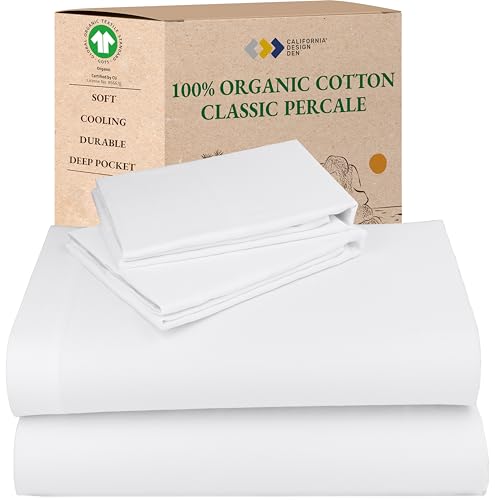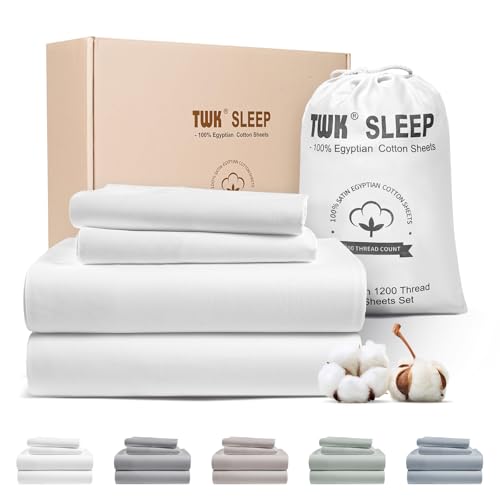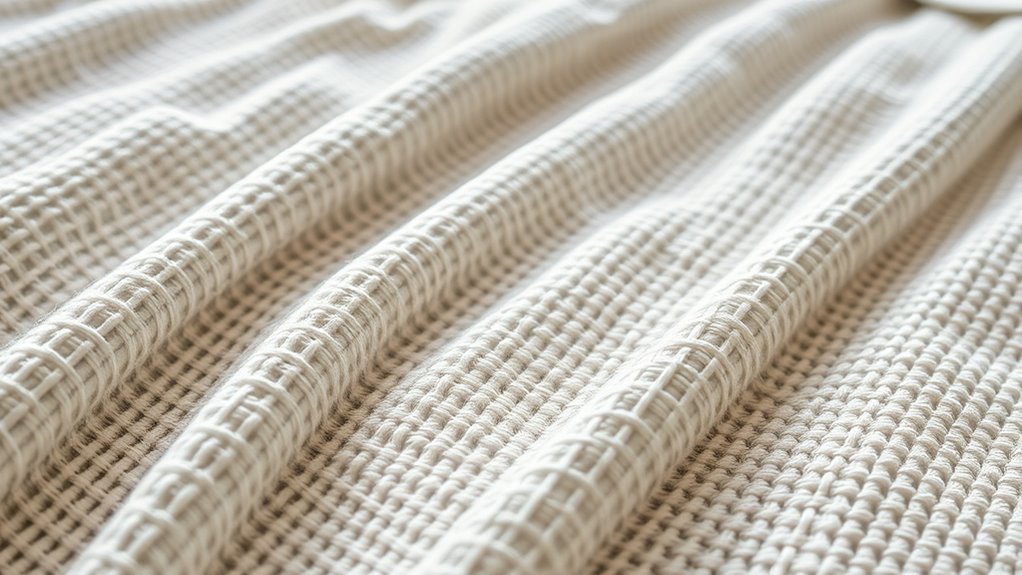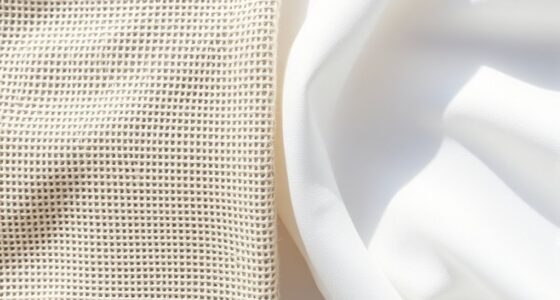High thread count doesn’t necessarily mean better sheets. It’s a marketing tactic that often overemphasizes softness, but quality depends more on the fiber type and manufacturing process. Premium fibers like Egyptian cotton and skilled weaving create durable, comfortable sheets regardless of thread count. So, don’t be fooled by high numbers—look deeper into the materials and construction to find truly luxurious bedding. Explore further to uncover the secrets behind creating high-quality sheets that last.
Key Takeaways
- Thread count alone doesn’t determine sheet quality; fiber quality and manufacturing processes are more important.
- High-quality fibers like Egyptian cotton produce softer, more durable sheets regardless of thread count.
- Manufacturing techniques and finishing methods significantly impact softness and longevity beyond thread count numbers.
- Lower thread count sheets made from premium fibers can outperform higher thread count options of lesser quality.
- Focusing on the details behind thread count helps consumers avoid marketing hype and choose truly luxurious, durable sheets.

Have you ever wondered if a higher thread count truly means a better sheet? It’s a common question because, on the surface, it seems logical—more threads should equal softer, more luxurious bedding, right? But the truth is, thread count isn’t the only factor that determines quality. Fiber quality and manufacturing processes play a far more crucially role in how your sheets feel and last over time. When manufacturers tout high thread counts as the ultimate sign of luxury, they often overlook these critical details, which can lead to marketing hype rather than genuine quality.
Fiber quality is fundamental. High-quality fibers, like long-staple cotton or Egyptian cotton, produce stronger, smoother threads that feel softer against your skin and are more durable. Cheaper fibers or shorter staples tend to create rougher, less resilient fabrics, even if the thread count is high. That’s because the quality of the fiber directly impacts the final product’s texture and lifespan, regardless of how many threads are woven into the fabric. When you focus solely on thread count, you might miss out on the importance of choosing sheets made from premium fibers that provide a more luxurious and longer-lasting experience.
High-quality fibers like Egyptian cotton ensure softer, more durable sheets beyond just thread count.
Manufacturing processes also matter immensely. The way sheets are woven, finished, and treated influences their softness and durability. For example, sateen or percale weaves create distinct textures, and the finishing techniques—such as mercerization or enzyme washes—can make sheets feel silkier or crisper. These processes can enhance the fabric’s appeal without necessarily increasing the thread count. Conversely, some manufacturers may increase thread count by using thinner threads or weaving techniques that aren’t as durable, leading to sheets that pill or wear out faster. It’s essential to look beyond the thread count and understand how the sheets are made because this can considerably affect your comfort and investment.
Additionally, understanding fiber quality and manufacturing techniques can help you make more informed choices, ensuring you get sheets that truly meet your comfort and durability expectations.
In essence, a high thread count doesn’t automatically guarantee a superior sheet. Instead, focus on the fiber quality and manufacturing processes involved. A lower thread count sheet made from high-quality fibers and well-crafted with expert techniques can often outperform a higher thread count sheet that’s cheaply made. When shopping, don’t be seduced solely by numbers—delve into the details of what’s behind those numbers. That way, you’ll find sheets that truly feel luxurious, last longer, and deliver real value, rather than falling for marketing hype that overemphasizes thread count as the ultimate indicator of quality.

Shilucheng 100% Cotton Queen Size Sheets Set – 600 Thread Count,Luxury Egyptian Cotton Bed Sheets,5-Star Hotel Quality Sheets, Breathable & Cooling, 16 Inch Deep Pocket – 4 Piece (White, Queen)
LUXURY COTTON EXPERIENCE: Enjoy the softness of our 600 thread count cotton sheets, providing a modern and sleek…
As an affiliate, we earn on qualifying purchases.
As an affiliate, we earn on qualifying purchases.
Frequently Asked Questions
Does Higher Thread Count Always Mean Better Sleep Quality?
You might think higher thread count means better sleep quality, but thread count myths often lead to misconceptions. In reality, a higher count doesn’t always guarantee comfort or durability. Instead, focus on fabric quality and weave. For better sleep quality, choose breathable, soft materials that suit your preferences. Remember, comfort and personal needs matter more than just the thread count, so don’t get swayed by marketing hype.
How Does Fabric Type Influence Thread Count Perception?
Think of fabric type as the brushstroke that shapes your sleep canvas. Your fiber influence and weave patterns play a vital role in how thread count is perceived. A high thread count on silky sateen feels different from the same count on coarse linen. The weave pattern and fiber quality determine softness, durability, and breathability, making fabric type the true artist behind your comfort, not just the numbers on a label.
Are Luxury Brands Inflating Thread Count to Justify Prices?
Luxury brands often inflate thread count numbers using clever marketing tactics to justify their higher prices. You might see higher thread counts touted as a mark of quality, but in reality, these brands leverage luxury branding to create a perception of superior comfort and durability. Don’t be fooled by marketing hype—focus on fabric type and weave quality, which truly influence the feel and longevity of your bedding, not just the thread count.
What Is the Ideal Thread Count for Different Climates?
When choosing sheets for different climates, you should consider fiber blends and thread count myths. For hot weather, opt for lighter, breathable fabrics like linen or cotton with a lower thread count, around 200-300. In cooler climates, higher thread counts of 300-500 in soft cotton or silk provide warmth. Remember, thread count alone doesn’t guarantee quality—focus on fiber type and weave, avoiding marketing hype.
Can Low Thread Count Sheets Still Be Durable and Comfortable?
Low thread count sheets can still be durable and comfortable, defying thread count myths. Fiber durability plays a vital role, meaning high-quality fibers like long-staple cotton ensure longevity and softness. You don’t need a high thread count to enjoy these benefits; instead, focus on fiber quality and weave. Durable, comfortable sheets come down to the right combination of fiber strength and craftsmanship, not just numbers on a label.

California Design Den Queen Sheet Set – Soft 100% Organic Cotton Sheets with Deep Pockets, Crisp Percale, Breathable and Durable Bedding Set – White
GOTS Certified 100% Organic Cotton Sheet Set – Classic Percale Sheets. Gentle on skin, this queen sheet set…
As an affiliate, we earn on qualifying purchases.
As an affiliate, we earn on qualifying purchases.
Conclusion
Now that you see through the marketing haze, imagine your sheets as a quiet forest—layer upon layer of soft leaves, each one essential but not overwhelming. Don’t be fooled by lofty numbers chasing you like shadows; instead, focus on how the fabric feels against your skin and how it supports your sleep. When you choose quality over hype, you create a sanctuary of comfort where every night feels like a peaceful, gentle dawn.

TWK 1200 TC 100% Egyptian Long-Staple Cotton Bedding Sheets Set, Luxury Hotel Style Deep Pocket with Elastic Reinforced Seams Sheet Set, Soft & Comfy Natural Sheets (White, Queen)
【Luxurious Feel】1200 thread count bedding crafted from 100% Egyptian long-staple cotton fibers; Silky sateen weave maintains breathable while…
As an affiliate, we earn on qualifying purchases.
As an affiliate, we earn on qualifying purchases.

Queen Size 4-Piece Sheet Set – Extra Soft, Breathable & Cooling – Hotel Luxury Durable Bed Sheets – Deep Pockets, Easy-Fit & Wrinkle-Free – Blush Stripes Oeko-Tex
4 PIECE BED SHEET SET: 2 pillow cases and a flat sheet and fitted sheet. Flat Sheet (102”x…
As an affiliate, we earn on qualifying purchases.
As an affiliate, we earn on qualifying purchases.










